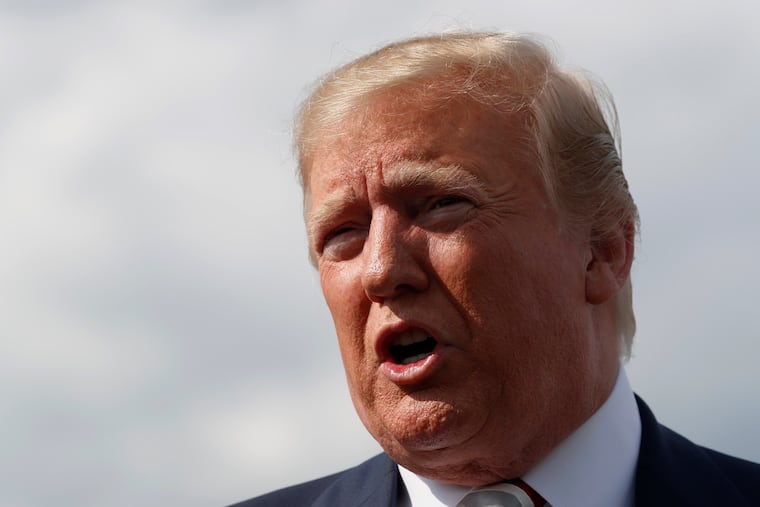White supremacists are right about one thing: Donald Trump is their president | Solomon Jones
So much of Trump’s rhetoric on race has lined up with white nationalist doctrine that his backers — and his detractors — have a hard time believing he’s had a sudden change of heart.

I agree with white supremacists on one point. Donald Trump has become a leader in their movement, and nothing he says can change that.
White supremacists backed Donald Trump from the time he began his presidential campaign by calling Mexican immigrants criminals and rapists, and I believe they’ll continue to back Trump. Even after Trump read a statement from a teleprompter denouncing “racism, bigotry, and white supremacy” in the wake of two mass shootings that killed at least 31 people in Dayton and El Paso, his support from far-right racists is ironclad.
The reason is simple. So much of Trump’s rhetoric on race has lined up with white nationalist doctrine that his backers — and his detractors — have a hard time believing he’s had a sudden change of heart.
After all, Trump is the same man who was enthusiastically supported by the Crusader, official newspaper of the Ku Klux Klan, during his 2016 campaign for president. Even though the Trump campaign claimed to reject racism in the wake of that endorsement, Trump brought into the White House far-right strategist Steve Bannon, a figure white nationalists claimed as their own.
After initially denouncing racism following the murder of antiracism demonstrator Heather Heyer during rallies by white supremacists in Charlottesville, Trump blamed both sides for the violence, claiming “very fine people” participated in the rallies. White supremacists thanked Trump for his words, which were widely seen as supportive of the racists who participated in those deadly demonstrations.
No one statement could change what America and the world has seen from Trump for years. That’s why the white supremacist who killed 51 people in New Zealand mosques was right when he called Trump “a symbol of renewed white identity and common purpose." That’s why the alleged El Paso gunman who wrote down white supremacist views before gunning down more than 20 people parroted Trump in his online rant. And that’s why Trump’s statement that Americans should speak with one voice against racism and white supremacy rings so hollow.
The shootings being carried out by white supremacists are not about violent video games, as Trump stated. Nor are they primarily driven by mental illness, as Trump claimed. Experts say most mentally ill people are not violent, and are more likely to be victims of violence than perpetrators.
No, this is about hatred. It is about easily manipulated young white men who are radicalized online by the white nationalist ravings of the president himself.
And in case you think this is just my assessment, I invite you to review the polls, which show that most Americans believe the president is not doing enough to stop the spread of white supremacy. Some polls suggest that Americans believe Donald Trump is helping to promote white supremacy.
Polls don’t tell the whole story, since those who hold racist views are not always forthcoming with pollsters. However, the actions of some of Trump’s followers help fill in the blanks.
The numbers tell us that acts of violence tied to white supremacy have increased during Trump’s presidency. And there is another measure that’s even harder to quantify. It’s the danger that can arise from the responses of Trump’s followers when the president’s racist narrative is threatened.
I sensed that danger when former Texas Congressman Beto O’Rourke stood on the national stage at a presidential debate and said that his hometown, El Paso, was one of the safest cities in America. He talked with pride about El Paso’s diversity, its wealth of immigrants, and its location on the border between the United States and Mexico. O’Rourke said El Paso was safe, not in spite of its diversity, but because of it.
As proud as I was to hear him make that statement, I knew there would be others who would react with anger. After all, Donald Trump has spent years trying to convince America that impoverished brown immigrants are invaders who are here to rape our women and kill our children.
So when I heard that a young white supremacist wrote down his hatred for Latino immigrants, then followed up by driving to El Paso to shatter the safety O’Rourke talked about, and to murder the very idea that brown immigrants belong in America, I was not surprised. None of us should have been surprised.
Now where do we go from here?
It’s true that the president has shifted his rhetoric over the last few days to speak about unity. But it’s also true that he could just as easily shift back to the kind of divisive — and yes, racist — language that has helped to get us to this point. We’ve seen him do it before.
The question now is really about the rest of us. What are we prepared to do in the face of a poisonous hatred that would make Americans kill each other?
Because as Donald Trump has shown us during the turbulent years of his presidency, it’s not just about what you say. It’s about what you do.
Solomon Jones is the author of 10 books. Listen to him weekdays 7 a.m. to 10 on 900 AM/ 96.1 FM WURD.